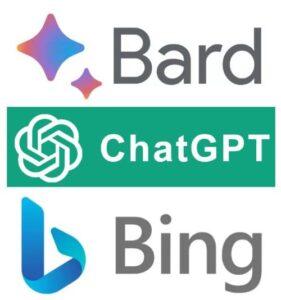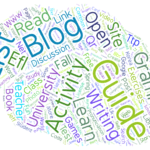 For the last few months, I’ve been using ChatGPT, Bing, and Bard to help generate lesson materials and activities for my classes at Busan University of Foreign Studies. This past semester I taught conversation-based courses like ‘Language and Culture’ and ‘Project English’. I also taught in the graduate school of Interpretation and translation. I was transparent with students about how materials were generated and also encouraged them to experiment with AI to interact in simulated conversations with corrective feedback. Below are many of the prompts I’ve used and some commentary on the results. In certain cases, I’ve found that particular prompts work better with one service over another. If so, it’s noted below. The experimentation continues, so stay tuned for Part#2 soonish.
For the last few months, I’ve been using ChatGPT, Bing, and Bard to help generate lesson materials and activities for my classes at Busan University of Foreign Studies. This past semester I taught conversation-based courses like ‘Language and Culture’ and ‘Project English’. I also taught in the graduate school of Interpretation and translation. I was transparent with students about how materials were generated and also encouraged them to experiment with AI to interact in simulated conversations with corrective feedback. Below are many of the prompts I’ve used and some commentary on the results. In certain cases, I’ve found that particular prompts work better with one service over another. If so, it’s noted below. The experimentation continues, so stay tuned for Part#2 soonish.
Producing Study Materials
- Creating and annotating lists of vocabulary, idioms, sayings, and collocations
- Preparing readings, debate materials, and role plays
Interacting with AI
Odds & Ends
Generating study materials
Below are some of the prompts I’ve used. I have found it easier to maintain format when copying and pasting from Bing and Bard as opposed to ChatGPT, but in most cases, some tweaking of formatting and content is required.
Creating and annotating lists of vocabulary, idioms, sayings, and collocations
From scratch:
Select 20 advanced English vocabulary words and phrases related to _______.
Select 30 IELTS Level 7 vocabulary words and phrases related to _______.
Write a list of 15 idioms or sayings related to ________.
Create a list of 20 collocations related to ________
List the 20 most common phrasal verbs related to _________.
From an online source
Select the 20 most difficult vocabulary words from this article: _____
Select the 15 IELTS Level 6 vocabulary words from this video: _____
I will usually refine the list by deleting words that are too easy or too difficult and adding any others that occur to me. I then produce study materials with these types of prompts.
Occasionally, I’ll just have the AI tool complete the whole process with a prompt like:
Based on the transcript of the video below, select 15 challenging vocabulary words. For each word, write a short English definition, a Korean translation in parenthesis, IPA pronunciation, and use it in an example English sentence
Here is the video:
From a list of words
These are the types of prompts I use to provide translations, definitions, and examples.
For each word or phrase below, write an IPA notation, a Korean translation, and a short English definition, and use it in an example English sentence.
For each saying below, write a short English definition, a Korean translation in parenthesis, and use it in an example English sentence.
These two steps (generating vocabulary and producing annotated study lists) can be combined with a prompt like:
Create a list of 15 idioms or sayings related to _________. For each one, write a short English definition, a Korean translation in parenthesis, and use it in an example English sentence.
Preparing reading materials and related resources
Many of the posts on this site come from student study groups. Generally, I choose a topic, find a few related online resources, and think up a few discussion questions. Students then choose articles or videos from the list, use them as study materials, and then discuss those and the discussion questions. Over time, I update and tweak materials. These AI tools have helped automate that process. You can see an example of this type of material generation in the Scent & Smell post.
Here are the types of prompts I use:
- I am producing materials for intermediate-level EFL students in Korea around the theme of ‘scent and smell’.
- Write a 200-word, three-paragraph introduction that addresses the importance of ‘scent and smell’, its connection to memory, and its therapeutic applications.
- List 5 recent articles related to the theme of ‘scent and smell’ Include the title, URL, and a one-sentence description.
- List 5 recent videos from YouTube or Ted Talks related to ‘scent and smell’. Include the title, URL, and a one-sentence description.
- Finally, create a list of 10 discussion questions related to ‘scent and smell’.
I usually edit the text a bit, select the most appropriate articles and videos, and tweak the discussion questions.
I then use the vocabulary-related prompts above to add reference materials.
To prepare Debate Materials
Similarly, I have used these AI tools to generate materials that can be used for in-class debates or debate style discussion groups.
- I am preparing materials for a TOEFL level 90-100 EFL university class in Korea.
- I would like you to prepare the following materials based on the debate topic of “a person should always ask for consent before a first kiss”.
- a 200-word article arguing the ‘pro’ stance labeled in bold as ‘Pro Stance’
- a 200-word article arguing the ‘con’ stance. labeled in bold as ‘Con Stance’
- from those articles, create a numbered list of the 12 most difficult vocabulary words. write the word in bold italics, a short English definition, a Korean translation in parenthesis, and on a new indented line, use it in an example English sentence
- 10 discussion questions
To Prepare Role Play Dialogues
Write a 300-word English role-play between a Korean flight attendant and an Australian passenger traveling from Sydney to Seoul. The language level should be appropriate for intermediate EFL university students.
Tweaks
Rewrite this adding another character who is an American having a conflict with the Australian passenger.
Rewrite this so that the American passenger has a fear of flying and the Australian passenger is trying to relax them by making jokes.
Students using AI as a conversation partner
I’ve gotten mixed results using the big three free (for now) AI Tools [ChatGPT, Bing, and Bard] for this, but this has tremendous potential for providing language learners with unlimited opportunities for conversation practice and real-time, personalized corrective feedback. There are already a number of apps (like Talkio AI , TalkPal , and Speak) that provide a better interface and speaking functionality. No doubt, more will be coming and this kind of practice will become commonplace in language learning. For now, here are some of the prompts I’ve had students use.
I am studying English and would like to practice my conversation skills by role-playing with you. Let’s pretend that we are strangers sitting next to each other on a plane getting to know each other. You begin the conversation. If my response contains language errors, please retype what I say in correct English (in parentheses).
Other Possible scenarios
-
- we are on a blind date
- I am applying for a job
- I’m ordering food at an Italian restaurant
- I’m talking to my friend about vacation plans
(The above prompts work better with Bing. The one below works better with ChatGPT)
Pretend you are ________________. Let’s have a conversation. You start.
Harry Potter, Albert Einstein, Steph Curry, Kim Yuna, Suga, Taylor Swift
Practice translating from one language to another
This is more complex task, but useful for those who are studying translation and interpretation.
I am an English-Korean translator and I want to practice my consecutive translation skills with you. Let’s role-play a scenario where Jane is a sales manager for an electronics manufacturer and John is a potential client. I will be Jane’s interpreter. You will write John’s dialogue in English and I will translate it into Korean. Then you will write Jane’s dialogue in Korean and I will translate it into English. If I make any mistakes in either language, please correct me by writing the correct sentence in parentheses. Please start the role-play by writing John’s first sentence in English.
Odds & Ends
Here are some of the other prompts I’ve used and things I’ve noticed while using ChatGPT, Bard, and Bing.
Writing summaries
Write a two-paragraph summary of this video:
Write a three-paragraph summary of this article:
Error Correction Practice
I am teaching modal verbs and the past perfect tense to first-year university students in Korea. Write 10 sentences that contain common errors they might make. Below each sentence write the corrected version.
Finishing the Job
If ChatGPT or Bing stop generating text before finished, type ‘please continue where you left off’.
Bing and Bard can be very good for specific searches and statistic gathering
- What is the student population of the five largest universities in Busan, Korea?
- List the average TOEIC scores in Korea, Japan, China, Vietnam, and Thailand.
- Compare the price of a Big Mac in 10 countries around the world (including South Korea).
- List the average amount of sleep for adults in Korea, Japan, China, France, USA, Australia, and Argentina.
They’re good at coming up with results, but I sometimes doubt their voracity. When that’s the case, I ask ‘What is the source of that information” or “How confident are you in the accuracy of that information”. That usually results in links that can be used to verify data.
Summer vacation is here! Time to research, experiment, and get ready for Fall Semester.
Stay tuned for more adventures in Generative AI.

Views: 452






Leave a Reply